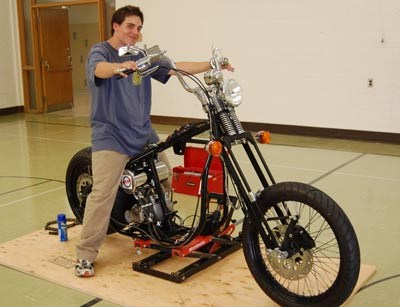BY GIANNI UBRIACO
Twenty-year-old Leslie Kiddle is spending much of his time these days helping to rebuild a 2009 Titan Fat Bobber motorcycle. He has all of the parts and tools around him to work with, and even someone with experience to show him how to do it .
As he places each part in its rightful place, the motorcycle acts as a mirror to his own life, which is also slowly being rebuilt.
He’s one of 25 local youth participating in the Greater Sudbury Police Service’s (GSPS) Ozzy’s Garage Youth Mentorship Program. Led by a former member of Canada’s Most Wanted List, Rick “Ozzy” Osborne, the program is aimed at reaching local at-risk youth and teaching them that redemption is possible.
“This is a chance to turn my life around,” Kiddle said.
Kiddle has had numerous run-ins with the law, including shoplifting at the tender age of 11. Within a year, he was a member of a gang. That lead to charges of possession and trafficking of various illegal drugs, and more than a handful of weapons charges. Kiddle’s criminal activities continued until his last weapons violation at the age of 18. That’s when he had to spend six days in jail.
“I smartened up pretty quick,” he said. “The judge said next time you mess up, we’re not going to bring you to court; you’re going straight to jail.”
He’s been a law-abiding citizen for more than a year now, and said he is happy to be part of the rebuild program.
Every other week since July 12 and until Oct. 8, the youth get together daily from 12 to 5 p.m. to work on the bike.
Once completed, the motorcycle will be raffled off. All proceeds will go to the GSPS Chief’s Youth Initiative Fund.
For Kiddle, the program is about a lot more than learning how to put a motorcycle together. It’s about learning life skills from the program’s director.
Osborne spent nearly a quarter century in jail for armed robbery and various weapons charges. He is a testament to the fact that it’s never too late to turn one’s life around.
“He’s an excellent role model,” Kiddle said. “He’s been through the system, and his telling us his life story teaches us why we shouldn’t get into trouble.”
His message to troubled youth is to get involved in something positive.
“If you don’t follow the right path, you’re going to dig yourself a hole that you can’t dig yourself out of, and if you try, everyone else is going to try to push you back in it,” he said. “Trust me, it’s hard to get out of that hole.”
Osborne knows all too well how hard it is. After leaving prison more than a decade ago, he decided to try to make up for his mistakes by dedicating the rest of his life to talking to youth about the dangers of gangs, drugs, and criminal activity.
He said he wants to help prevent other kids from making the same mistakes he did.
“With a guy like me, they know I’ve been there,” he said. “I survived, thanks to God’s grace. I got to mature, and I hope the same for them.”
He added that the program provides a healthy environment, structure, and hands-on training for the kids, while also providing “more tools in their tool box for dealing with various issues.” Most of all though, he said it’s a chance for himself, and for the youth, to heal and improve.
“Everyone who gives back knows it’s a two-way street,” he said. “To work in a community and work with that one or two kids who get it — it’s incredible.
“These kids are peer-influenced big time. If you save one of them, the one that you save pulls 10 others with them.”
Looking back, Osborne began his path to redemption in 1993, when he put an end to his drug addictions and gang affiliations. He went on to become one of only 17 Canadian inmates in a maximum security prison system to ever earn a university degree — a bachelor of arts degree in psychology at Queens University — while incarcerated.
Two years ago, he joined Astwood. The organization is made up of criminal and social justice strategists who provide evidence-based program development, implementation and evaluation services to various organizations.
Today, he continues to assist the company in designing and delivering effective interventions for youth that are involved with gangs or who are in danger of gang involvement.
He also recently came out with his own book, White Noise: A Journey Through Drugs, Gangs and Prison.
Sudbury area, GSPS education co-ordinator Anna Barsanti, who was instrumental in bringing this project to Sudbury, said part of her job “is to educate the public about youth issues and to look at ways to engage youth in positive activities,” Barsanti said. “During (Osborne’s) speaking sessions, we discovered audiences were fully attentive. You could hear a pin drop.”
Barsanti found out Osborne had recently completd a similar rebuild project with youth on a small reserve in Quebec.
The GSPS decided to put Osborne’s skills to good use, by becoming the first city police service to implement the program.
“We wanted (at-risk youth) to have an opportunity to work with Rick first-hand because he’s lived the life and come out the other end,” she said. “The message we’re trying to send is it doesn’t matter what you’ve done; you can design a better tomorrow. You just have to believe in yourself.”
Join Sudbury.com+
- Messages
- Post a Listing
- Your Listings
- Your Profile
- Your Subscriptions
- Your Likes
- Your Business
- Support Local News
- Payment History
Sudbury.com+ members
Already a +member?
Not a +member?
Sign up for a Sudbury.com+ account for instant access to upcoming contests, local offers, auctions and so much more.
